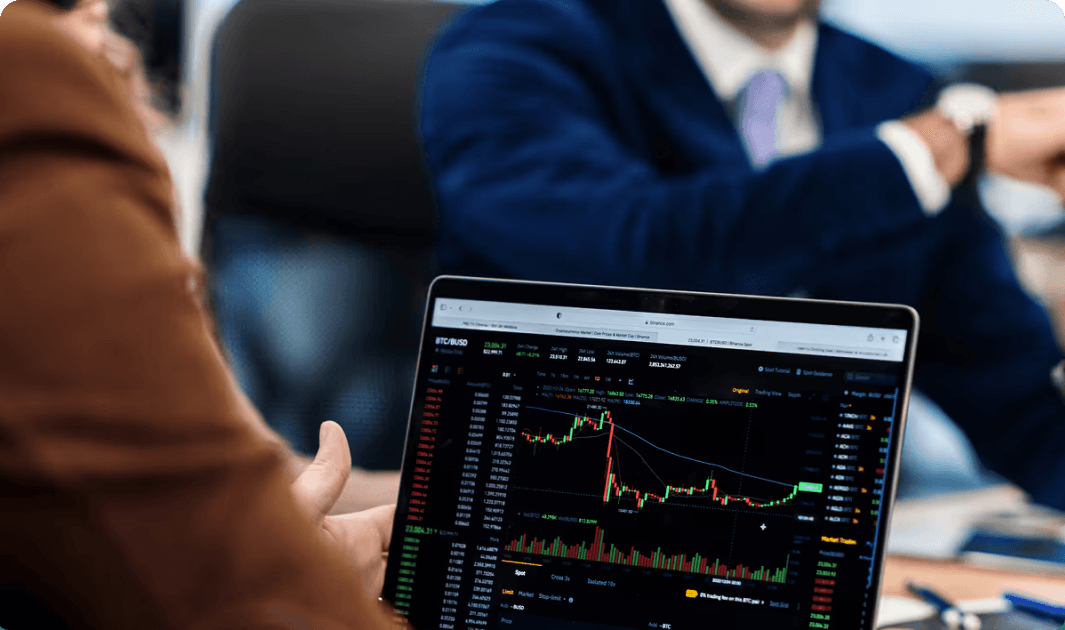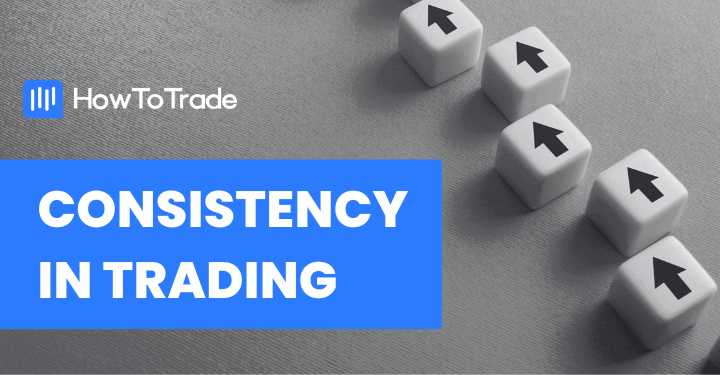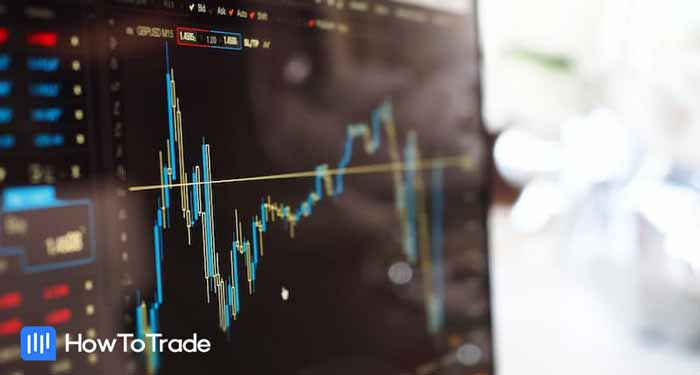
- The time it takes to learn forex trading varies significantly depending on factors like prior experience, dedication, and chosen learning style.
- Forex is not a get-rich-quick scheme and involves mastering fundamental and technical analysis, risk management, and emotional control.
- Consistent profit is challenging to achieve, and focusing on building a solid foundation, developing skills, and managing risk is crucial for navigating the complexities of the market.
The question on the minds of many aspiring forex traders is this: How long does it take to learn forex and become profitable?
The truth is, there’s no one-size-fits-all answer. However, embarking on this journey requires a realistic understanding of the time commitment, dedication, and continuous learning involved.
This blog post aims to be your guide, unveiling the factors influencing the learning curve and providing practical tips to navigate your forex trading adventure.
 Table of Contents
Table of Contents
- How Long Does it Take To Learn Forex?
- What are the Stages of Learning Forex?
- What Factors Determine How Long It Takes to Learn Forex?
- How Hard Is It To Learn Forex?
- How Do You Speed Up Your Forex Learning Process?
- What are the Most Common Mistakes Forex Traders Make While Learning?
- What Tips for Success Do We Have For New Traders?
- Are There Any Free Resources Available to Learn Forex Trading?
- What are the Potential Risks Involved in Forex Trading?
- How Much Money Do I Need to Start Trading Forex?
- Conclusion
How Long Does it Take To Learn Forex?
Clearly, the answer to this question is subjective and can vary based on an individual’s ability to learn. However, generally, it might take anywhere from six months to two years to develop a solid understanding and potentially become profitable in forex. But this is just an estimate. Learning forex trading doesn’t have a one-size-fits-all timeframe, and several factors can significantly influence your learning journey.
Some might argue that it can take weeks or several months for a trader to learn the basics of the forex market and trading. It all depends on the individual and the tools used to learn the markets. These days, there are online courses, books, and videos that can make the learning process faster.
What are the Stages of Learning Forex?
For most learners coming across forex for the first time, the initial three months typically involve building a solid foundation. This crucial stage focuses on grasping the fundamentals of the forex market. The next stage involves developing your trading strategies, and the final stage is where you put what you’ve learned into practice. We’ll call these three stages the beginner, intermediate, and advanced stages of forex learning:
1. Beginner Stage
This often takes the first three months of learning. During this time, you’ll learn the following:
- Market participants and their roles: This is where you try to understand those participating in the forex market you intend to be a part of. Understanding who drives the market, like central banks, commercial banks, and individual investors, is one of the first crucial steps to forex trading.
- Currency pairs and valuations: This is where you’ll learn how currencies are paired and traded, along with factors affecting their exchange rates.
- Basic economic factors impacting exchange rates: You’ll also get to familiarize yourself with macroeconomic concepts like interest rates, inflation, and economic data releases that can influence currency movements.
In addition to these fundamentals, you’ll also delve into key terminology related to technical and fundamental analysis, the two main approaches forex traders use. You’ll also become familiar with trading platforms and forex brokers, learning their functionalities and how to navigate them effectively.
2. Intermediate Stage
Once equipped with the basics, the next stage, which can last anywhere from 3 to 6 months, involves developing your trading strategies. This phase involves:
- Exploring and understanding different trading strategies: This includes learning about technical analysis, which utilizes chart patterns and indicators to identify trading opportunities, and fundamental analysis, which focuses on analyzing economic data and news to forecast currency movements.
- Backtesting chosen strategies: Here, you start applying your chosen strategy to historical data to evaluate its effectiveness and identify potential shortcomings.
- Refining your strategy: Based on the backtesting results, you’ll need to refine and adjust your strategy to suit your risk tolerance and trading goals.
3. Advanced Stage
The final stage, which is an ongoing process, is where you practice trading by putting your knowledge and strategies into action through live trading. However, it’s crucial to start with a demo trading account first. Demo accounts allow you to:
- Simulate real trading conditions with virtual money, gaining valuable experience and building confidence at your own pace without risking real money.
- Test and refine your strategies further in a risk-free environment, allowing you to make adjustments and optimize your approach before risking real capital.
Most forex brokers offer demo accounts with which you can learn how to trade forex.
Once comfortable with demo trading, you can gradually transition to live trading, starting with small positions and increasing them as your experience and confidence grow.
In this final stage, you learn and sharpen your risk management knowledge. Otherwise, your forex trading journey will be short and filled with losses.
Generally, it might take anywhere from six months to two years to develop a solid understanding and potentially become profitable in forex. But this is just an estimate. Learning forex trading doesn’t have a one-size-fits-all timeframe, and several factors can significantly influence your learning journey.
What Factors Determine How Long It Takes to Learn Forex?
Several factors can significantly influence the time it takes to learn forex trading and potentially become profitable. Here are some key ones:
1. Prior Experience
Individuals with a background in finance, economics, or even other forms of trading likely have a steeper learning curve compared to complete beginners. Their existing knowledge of financial concepts and analytical skills can translate well to forex trading, allowing them to grasp new forex trading concepts faster.
2. Dedication
The time you dedicate to studying and practicing forex trading directly impacts your learning speed. Consistent effort toward understanding the markets, testing strategies, and refining your approach is crucial for achieving proficiency. Dedicating time to learning and actively practicing through reading recommended forex trading books and practicing on a demo trading account can significantly accelerate your progress.
3. Learning Style
Different individuals learn best through various approaches. Some people thrive in structured learning environments offered by courses or workshops, while others prefer independent research and experimentation. Identifying your preferred learning style and seeking resources that align with it can significantly enhance your learning efficiency.
4. Strategy Complexity
The complexity of your chosen trading strategy also plays a role in the learning timeframe. While simpler strategies focusing on basic technical indicators or fundamental analysis might be learned and implemented more quickly, mastering complex trading strategies such as the High-Frequency trading strategy or the ICT trading strategy typically takes longer and requires advanced knowledge.
How Hard Is It To Learn Forex?
Learning forex trading can be challenging, but it’s not necessarily impossible. In a way, anyone who wants can learn forex trading. It requires dedication, effort, and a willingness to learn and adapt continuously. Some aspects that most learners find difficult to get past when learning to trade are:
1. Complexity of the Forex Market
The forex market is dynamic and influenced by various factors, including global economics, central bank policies, and geopolitical events. In addition, there are market participants who many believe are maneuvering the prices of forex pairs for their own profits. These participants are called institutional traders, and some might argue that governments also influence currency prices for their own interests. Then, there are also correlations with other pairs or other commodities that may be complex for some to understand.
The complexities surrounding the forex market are many. Understanding these nuances and their impact on currency movements takes time and effort.
2. Technical Knowledge
Effective forex trading involves understanding technical and fundamental analysis. Technical analysis requires learning chart patterns and indicators, while fundamental analysis necessitates grasping economic data and its impact on currencies. But the problem is that there are so many strategies to learn. Not only that, the effectiveness of every strategy is seasonal. In other words, a strategy that works today may not work as well tomorrow.
All of these can pile up to be quite a lot for a learner to get past. For that matter, many beginner traders use cheat sheets to retain information more effectively.
3. Trading Psychological Challenges
Managing emotions like fear and greed can be difficult, especially during market fluctuations. The trading psychology of most traders is what holds them back from achieving consistency in trading. Maintaining discipline and sticking to your trading plan becomes crucial to avoid impulsive decisions.
4. Risk Management
Forex trading involves inherent risks, and managing them effectively is essential. Learning proper risk management techniques, like setting stop-loss orders and managing position sizes, takes practice and discipline.
How Do You Speed Up Your Forex Learning Process?
While it can be somewhat challenging to learn forex, there are several ways to potentially speed up your learning process in forex trading. For instance, actively engaging in learning resources, seeking trading mentorship and coaching, and prioritizing consistency over results can help you reach profitability faster.
Let’s take a deeper dive.
1. Leverage Your Existing Knowledge
If you have a background in finance, economics, or even other forms of trading, leverage that foundation to your advantage. Focus on bridging the gap between your existing knowledge and the specific aspects of forex trading. This can significantly reduce the time needed to grasp fundamental concepts and terminology. For that purpose, you can read books, watch trading movies, and join forex trading forums.
2. Actively Engage with Learning Resources
Explore various learning resources beyond simply reading textbooks or articles. Consider enrolling in online courses or workshops that provide structured guidance and expert insights. Additionally, engage in active learning by taking notes, participating in discussions with other learners, and applying the acquired knowledge through practice exercises and demo accounts. You can also join HowToTrade’s trading academy, where we teach everything needed to start trading forex.
3. Seek Mentorship from Experienced Traders
Connecting with experienced forex traders can provide valuable guidance and accelerate your learning. Mentors can offer personalized insights, answer your specific questions, and help you identify and correct potential blind spots in your approach. However, ensure you seek guidance from reputable and experienced individuals to avoid falling prey to misinformation or scams. For instance, HowToTrade has a trading academy where trading coaches with decades of experience can hold one-on-one sessions with you as you navigate the market. In addition, HowToTrade provides a TradeTogerther platform where you can trade alongside experienced coaches and like-minded traders.
4. Focus on a Specific Strategy (initially)
While exploring different trading strategies is essential, consider focusing on mastering one simpler strategy initially. This allows you to concentrate your learning efforts and gain practical experience applying your knowledge in a controlled environment. Once comfortable with a basic strategy, you can gradually explore more new strategies as your experience grows. One great method to do that is to use the 5-3-1 trading strategy.
5. Prioritize Consistency and Practice
Consistent dedication is crucial for accelerated learning. Allocate dedicated time for studying, practicing through demo accounts, and analyzing your performance. Regularly review your trades, identify areas for improvement, and refine your strategy based on your learnings.
What Are the Most Common Mistakes Forex Traders Make While Learning?
Even the most enthusiastic forex learners can fall victim to common mistakes and bad trading habits, hindering their progress and potentially leading to losses. Here are some of the most frequent missteps to be aware of:
1. Lack of a Trading Plan
Entering the market without a well-defined trading plan is akin to navigating uncharted waters without a map. A comprehensive plan should outline your entry and exit points, risk management strategies, and overall trading goals. Winging it or making impulsive decisions based on emotions can lead to disastrous consequences.
2. Overtrading
Especially in the initial stages of excitement, beginner traders often fall prey to the temptation of overtrading. This involves making excessive trades, often disregarding their trading plan or risk management guidelines. Overtrading can lead to emotional decision-making, increased transaction costs, and, ultimately, higher chances of losses.
3. Ignoring Risk Management
Forex trading involves inherent risks, and failing to prioritize risk management can be detrimental. This includes neglecting to set stop-loss orders to limit potential losses on losing trades or failing to properly manage position sizes relative to your account capital.
4. Revenge Trading
Letting emotions dictate your trading decisions is a recipe for disaster. When facing losses, some traders attempt to “revenge trade” by aggressively trying to recoup their losses immediately. This often leads to rash decisions, further losses, and a cycle of emotional trading that can be difficult to break. It can be helpful to know why revenge trading happens and how to stop it.
5. Unrealistic Expectations
Entering the forex market with unrealistic expectations of quick and easy riches is a surefire way to set yourself up for disappointment. Forex trading requires dedication, continuous learning, and a disciplined approach. Understanding that success takes time and effort is crucial for maintaining a healthy perspective and managing your expectations realistically.
By being aware of these common mistakes and consciously avoiding them, you can significantly increase your chances of success as a forex learner. Remember, forex trading is a journey of continuous learning, discipline, and risk management.
What Tips for Success Do We Have For New Traders?
While achieving consistent profits in forex trading is challenging and requires significant dedication and experience, here are some crucial tips to get you started on your journey as a learner, emphasizing responsible practices:
1. Manage Your Expectations
Forex is not a “get rich quick” scheme. It requires dedication, continuous learning, and acceptance of potential losses. So, set realistic goals. Focus on developing your skills and knowledge before aiming for consistent profits.
2. Build a Strong Foundation
Start from the basics and learn as much as you can. This knowledge will carry you through the rest of the journey. Understand market participants, currency pairs, and factors influencing exchange rates. Familiarize yourself with terms related to technical and fundamental analysis.
Then, choose a user-friendly platform that suits your needs and practice navigating it.
3. Develop Your Trading Strategy
Explore technical and fundamental analysis approaches and identify ones that align with your learning style and risk tolerance. Apply your strategy to historical data to evaluate its effectiveness and identify potential shortcomings. Based on backtesting results, adjust your strategy to suit your individual goals and risk tolerance.
4. Prioritize Risk Management
Practice your strategies with virtual funds to gain experience before risking real capital. Limit your potential losses on every trade by practicing proper risk management. As you start your forex trading journey, risk only a small percentage of your capital on each trade to avoid significant losses.
5. Continuous Learning and Practice
Keep yourself informed about economic news, market trends, and new trading techniques. Regularly review your past trades to identify areas for improvement. Consider mentorship from experienced traders or reputable educational resources to gain valuable insights.
Are There Any Free Resources Available to Learn Forex Trading?
Numerous free resources are available online and offline to learn about forex trading. These include:
- Educational websites and articles: Many websites offer free educational materials on forex trading basics and various strategies. HowToTrade is a perfect example of such a website, where you learn trading from the most basic level to the most advanced level, where you can trade your own capital.
- Online courses and webinars: Several platforms offer free introductory courses or webinars on forex trading. HowToTrade also offers a trading academy where you get to have one-on-one sessions with trading coaches who have been in the industry for decades.
- Forex trading forums and communities: Engaging with online communities can provide valuable insights and connect you with other learners. Common online forums where you’ll find forex traders are Forexfactory, Investing.com, Twitter, and Reddit.
- Social Media, movies, and documentaries: Apart from the above, you can also use more trendy ways to find news and data about the market. For instance, you can follow some of the best forex traders on Instagram and other social media platforms. Or you can utilize sophisticated ChatGPT trading strategies. Additionally, you can watch forex movies and documentaries.
What Are the Potential Risks Involved in Forex Trading?
Forex trading is inherently risky, and it’s essential to be aware of the potential downsides before you start. The most common risks include:
- Market volatility: Currency markets can be highly volatile, leading to significant losses if not managed properly.
- Leverage: Many brokers offer leverage, which can amplify both your profits and losses. It’s crucial to use leverage cautiously and understand the associated risks.
- Scams and fraudulent activities: Unfortunately, some scams and fraudulent activities target aspiring forex traders. That’s why choosing reputable brokers and conducting thorough research before investing money is vital.
How Much Money Do I Need to Start Trading Forex?
The minimum deposit required to start trading forex varies depending on your broker. Some brokers offer micro accounts with minimum deposits as low as $0, while others have higher minimums.
But do we recommend you get into forex without having anything? No. There used to be a time when thousands of dollars in personal capital was the ideal amount. But today, schemes, such as prop firms, allow you to trade huge amounts of money with very little investment. Nonetheless, it is usually recommended to make a relatively initial deposit to help you have a cushion for the first several months.
Having said that, it’s crucial to remember that risk management is paramount. Starting with a small amount and gradually increasing your capital and position size as your skills and experience grow is recommended.
Conclusion
Remember, the timeframe of 6 months to 2 years is just an estimate. Your journey into being a successful forex trader can vary significantly. Consistent learning, adaptation, and a commitment to continuous improvement are crucial for success in the dynamic and ever-evolving world of forex trading. Look at that in the most serious way – the same as an accountant or a lawyer must dedicate several years to learn a profession, a forex trader must take the necessary time to learn how to become profitable.
It’s also essential to manage your expectations and acknowledge that forex trading involves inherent risks, and losing capital is possible. You can embark on a well-informed and potentially rewarding path as a forex trader by approaching your learning journey with the right mindset and prioritizing risk management.
Risk Disclosure: The information provided in this article is not intended to give financial advice, recommend investments, guarantee profits, or shield you from losses. Our content is only for informational purposes and to help you understand the risks and complexity of these markets by providing objective analysis. Before trading, carefully consider your experience, financial goals, and risk tolerance. Trading involves significant potential for financial loss and isn't suitable for everyone.




